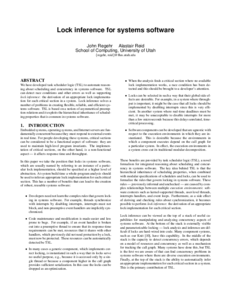Lock inference for systems software
John Regehr, Alastair Reid
University of Utah
[pdf]
Proceedings of the Second AOSD Workshop on Aspects, Components, and Patterns for Infrastructure Software (ACP4IS)
Boston, MA, USA
March 2003
Abstract
We have developed task scheduler logic (TSL) to automate
reasoning about scheduling and concurrency in systems software.
TSL can detect race conditions and other errors as well as
supporting lock inference: the derivation of an appropriate
lock implementation for each critical section in a system. Lock
inference solves a number of problems in creating flexible,
reliable, and efficient systems software. TSL is based on
a notion of asymmetrical preemption relations and it exploits
the hierarchical inheritance of scheduling properties that is
common in systems software.

BibTeX
@inproceedings{tsl-acp4is2003
, abstract = {
We have developed task scheduler logic (TSL) to automate
reasoning about scheduling and concurrency in systems software.
TSL can detect race conditions and other errors as well as
supporting lock inference: the derivation of an appropriate
lock implementation for each critical section in a system. Lock
inference solves a number of problems in creating flexible,
reliable, and efficient systems software. TSL is based on
a notion of asymmetrical preemption relations and it exploits
the hierarchical inheritance of scheduling properties that is
common in systems software.
}
, affiliation = {University of Utah}
, ar_file = {ACP4IS_03}
, ar_shortname = {ACP4IS 03}
, author = {John Regehr and Alastair Reid}
, booktitle = {Proceedings of the Second AOSD Workshop on Aspects,
Components, and Patterns for Infrastructure Software (ACP4IS)}
, day = {17}
, file = {tsl-acp4is.pdf}
, location = {Boston, MA, USA}
, month = {March}
, png = {tsl-acp4is.png}
, title = {{L}ock inference for systems software}
, year = {2003}
}
